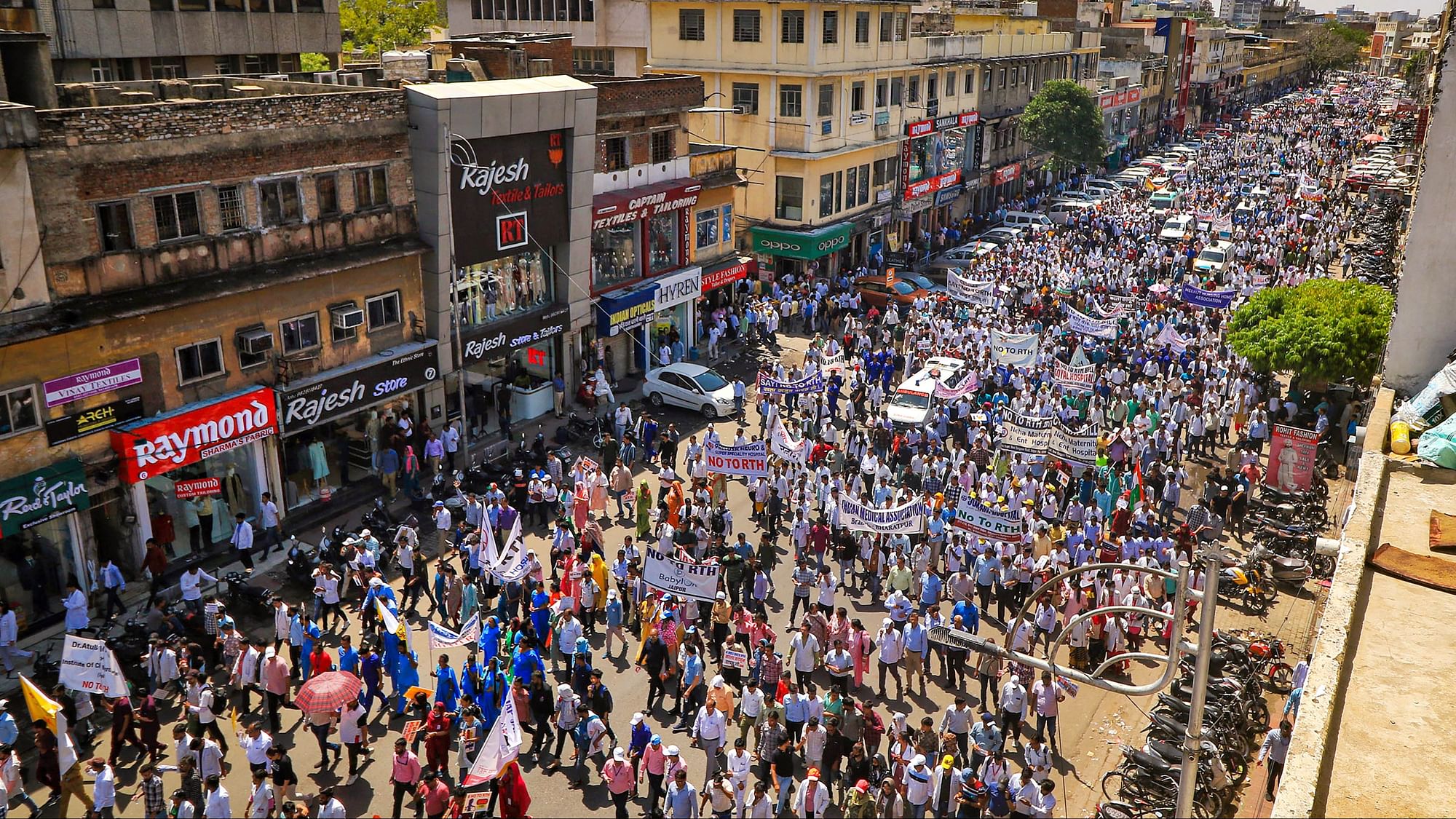
[ad_1]
Universal healthcare in India has not been explicitly acknowledged beneath the constitutional framework.
Published:
Doctors participate in a protest rally in opposition to Rajasthans Right to Health invoice, at MI Road in Jaipur, on Tuesday, 4 April.
|

The just lately handed right to health bill by the State of Rajasthan has brought about an uproar inrthe State. Being the primary State of the Country to supply its residents healthcare without any consideration, the correct to well being is a progressive piece of laws.
The regulation acknowledges free proper to well being for each resident of the state in any scientific institution. Clause 3 of the act offers an obligation to every scientific institution of the state to supply free well being providers with none prior fee in case of any emergency. The inclusive nature of the act additionally mandates the supply of reimbursement of the docs and the personal hospitals.
The proper to well being act by the State of Rajasthan is a welcome step in the direction of common and reasonably priced entry to healthcare. However it additionally requires fixing the institutional gaps just like the vacancies within the hospitals, entry to medicines, bridging the gaps and connecting extra folks with the present scheme like Chiranjeevi.
The Constitutionalisation of the Right to Health
The Right to healthcare entry or common healthcare in India has not been explicitly acknowledged beneath the constitutional framework. The argument of its inclusion notably stems from issues of entry to healthcare in India. In India, an Oxfam report reveals that one in each 4 folks faces discrimination in accessing healthcare on the idea of caste, gender, and faith.
The figuring out consider these concerns shouldn’t be solely the facet of caste, spiritual, and gender id, but additionally the financial standing. The authorized framework within the type of Directive rules of state coverage, mandates the states to take optimistic motion for making certain the entry to healthcare.
The Directive Principles of State Policy in Part IV of the India Constitution present a foundation for the correct to well being. Article 39 (E) directs the State to safe well being of staff, Article 42 directs the State to simply and humane situations of labor and maternity reduction, and Article 47 casts an obligation on the State to boost the vitamin ranges and lifestyle of individuals and to enhance public well being.
Moreover, the Constitution doesn’t solely oblige the State to boost public well being, it additionally endows the Panchayats and Municipalities to strengthen public well being beneath Article 243G (learn with eleventh Schedule, Entry 23).
The court docket in India has additionally interpreted the correct to well being in good spirit in a number of instances. The Supreme Court within the case of Bandhua Mukti Morcha v Union of India & Ors interpreted the correct to well being beneath Article 21 which ensures the correct to life.
The case of Robust Legislative Framework in India
In the case of State of Punjab & Ors v Mohinder Singh Chawla, the apex court docket reaffirmed that the correct to well being is key to the correct to life and ought to be placed on report that the federal government had a constitutional obligation to supply well being providers. In State of Punjab & Ors v Ram Lubhaya Bagga, the court docket went on to endorse the State’s accountability to keep up well being providers. Additionally, the fifteenth Finance fee really useful declaring the Right to well being as a elementary proper.
Evidence in India reveals the rampant discrimination in healthcare based mostly on caste, faith, gender, and financial concerns. Quite just lately in the course of the pandemic and even in the course of the vaccine distribution this, faultline has erupted.
Currently India’s public well being act lacks transparency and state responsibility. Neither the clinic institution act 2010 nor every other statute comprehensively cowl the state’s responsibility with regard to citizen’s concern of healthcare.
As a signatory to the ICESCR, India has obligations beneath Article 2(2) to “guarantee that (economic, social and cultural rights) … will be exercised without discrimination of any kind as to race, color, sex, language, religion, political or other opinion, national or social origin, property, birth or other status.”
The gradual incorporation of the worldwide rules shouldn’t be solely rooted in India’s parliamentary framework and conventions but additionally within the jurisprudence of Supreme Court extra just lately within the case of Navtej Singh Johar and Ors.
The Right to Health Act of Rajasthan is a step in the correct route for common healthcare. In a stratified society coupled with gross revenue inequality it will likely be useful for the poor and underprivileged. Moreover the act will give impetus to the citizen’s and civil society’s declare for a strong legislative framework for healthcare at National stage in absence of the constitutional recognition of proper to well being.
(Rajesh Ranjan is a Samta fellow, working in Rajasthan on Constitutional literacy, authorized support and neighborhood engagement.This is an opinion article and the views expressed above are the writer’s personal. The Quint neither endorses neither is accountable for them.)
(At The Quint, we’re answerable solely to our viewers. Play an lively function in shaping our journalism by becoming a member. Because the reality is price it.)
[adinserter block=”4″]
[ad_2]
Source link